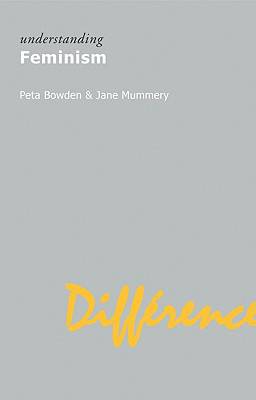
Door een staking bij bpost kan je online bestelling op dit moment iets langer onderweg zijn dan voorzien. Dringend iets nodig? Onze winkels ontvangen jou met open armen!
- Afhalen na 1 uur in een winkel met voorraad
- Gratis thuislevering in België vanaf € 30
- Ruim aanbod met 7 miljoen producten
Door een staking bij bpost kan je online bestelling op dit moment iets langer onderweg zijn dan voorzien. Dringend iets nodig? Onze winkels ontvangen jou met open armen!
- Afhalen na 1 uur in een winkel met voorraad
- Gratis thuislevering in België vanaf € 30
- Ruim aanbod met 7 miljoen producten
Zoeken
€ 182,45
+ 364 punten
Uitvoering
Omschrijving
"Understanding Feminism" provides an accessible guide to one of the most important and contested movements in progressive modern thought. Presenting feminism as a dynamic, multi-faceted and adaptive movement that has evolved in response to the changing practical and theoretical problems faced by women, the authors take a problem-oriented approach that maps the complex strands of feminist thinking in relation to women's struggles for equal recognition and rights, and freedom from oppressive constraints of sex, self-expression and autonomy. Each chapter focuses on a different cluster of concerns, demonstrating key moves in second-wave feminist thought, as well as some of the diversity in response-strategies that encompass both socio-economic and cultural-symbolic concerns. This approach not only shows how central feminist insights, theories and strategies emerge and re-emerge across different contexts, but makes clear that far from being 'over', feminism remains a vital response to the diverse issues that women (and men) find pressing and socially important.
Specificaties
Betrokkenen
- Auteur(s):
- Uitgeverij:
Inhoud
- Aantal bladzijden:
- 224
- Taal:
- Engels
Eigenschappen
- Productcode (EAN):
- 9781844651948
- Verschijningsdatum:
- 15/07/2011
- Uitvoering:
- Hardcover
- Formaat:
- Genaaid
- Afmetingen:
- 145 mm x 218 mm
- Gewicht:
- 358 g

Alleen bij Standaard Boekhandel
+ 364 punten op je klantenkaart van Standaard Boekhandel
Beoordelingen
We publiceren alleen reviews die voldoen aan de voorwaarden voor reviews. Bekijk onze voorwaarden voor reviews.











